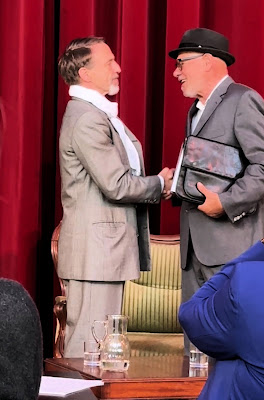Heinz Siebold did it again. My faithful readers remember his scenic staging of Rapallo last year. This time, he staged a fictitious interview with Joseph Wirth, a native of Freiburg and a member of the Catholic Centre Party (Zentrum). Wirth was Chancellor of the Reich in 1921 and 1922.
The Winterer Forum was packed for this Sunday matinée. So Red Baron had to take photos from behind using the tele lens of his iPhone.
1923 was an annus horribilis for Germany and its young Weimar Republic.
On January 11, French and Belgian troops occupied the Ruhr region on the pretext of the nonfulfillment of reparations under the Versailles Peace Treaty, i.e., lack of supply of lumber, telegraph poles, and coal.
The German side responded with passive resistance to the occupying forces. This, along with violent actions in the Ruhr region, led to a shortage of consumer goods due to a lack of production, and prices rose.
Inflation galloped during the year. While one U.S. dollar initially cost 4.20 gold marks, its exchange rate to the paper mark rose to an unimaginable 4.2 trillion marks at the height of demonetization in November 1923.
The German side responded with passive resistance to the occupying forces. This, along with violent actions in the Ruhr region, led to a shortage of consumer goods due to a lack of production, and prices rose.
Inflation galloped during the year. While one U.S. dollar initially cost 4.20 gold marks, its exchange rate to the paper mark rose to an unimaginable 4.2 trillion marks at the height of demonetization in November 1923.
In his lecture "Ruhr Occupation, Hyperinflation, Terror and Hitler Putsch. Was 1923 the Beginning of the End of the Weimar Republic?", Prof. Braun said that toward the end of the drama, inflation-adjusted salaries were paid out in the morning, at noon, and at night. Entire fortunes were wiped out within a year, so the fear of inflation still runs deep in the German soul. Monetary stability is one of the highest goods in Germany.
In contrast, during this crisis-ridden period, the Hitler putsch in Munich on November 9, 1923, was not taken seriously. The wearer of the upper lip beard* was derided in the press as Little Mussolini in white and blue, i.e., the Bavarian colors.
*The "Hitler beard" became popular in the USA at the end of the 19th century as a low-maintenance alternative to the full mustache and found its way to Europe.
More serious was the plan of the Executive Committee of the Communist International (ECCI) in Moscow to exploit the state crisis of the Weimar Republic at its height for an armed coup in Germany. When the KPD (German Communist Party) entered into government alliances with the SPD (Social Democrats) in the states of Thuringia and Saxony under the slogan of a left-wing "united front" in October 1923, the Moscow masterminds saw a favorable starting point for a left-wing uprising. However, a Reichsexekution (an intervention of the Berlin government) in both states nipped the overthrow plans in the bud.
Thus, the "German October" took place only in Hamburg. There, between October 23 and 25, 1923, revolting proletarian militants suffered 24 dead but also killed 17 policemen.
Hitler first gained Germany-wide notoriety through his trial, in which he was accused of high treason along with the prominent General Erich Ludendorff.
This is the only photo of all defendants after the mild verdicts in the Hitler-Ludendorff trial in Munich on April 1, 1924 (sic!). On the far right is Robert Wagner, the later hangman in Alsace, whom Hitler trusted unconditionally.
The Nazi breakthrough eventually came in 1929 when, due to the world economic crisis, mass unemployment in Germany reached the 30% mark in 1932, with 8 million people unemployed.

|
| Here is Juliane, young and naiv |
The "Impossible Interview" with Joseph Wirth.

|
| The protagonists greet each other. |

|
|
A visibly burnt-out Wirth (Peter Haug-Lamersdorf) with a heart condition, answers the journalist's questions. |

|
| Asking Wirth about the prospects of democracy in Germany (Heinz Siebold) |
Near the end of the interview, Wirth recalled the violent death of his foreign minister, Walter Rathenau, who, riding in his car, was "executed" with a submachine gun by right-wing extremists on June 24, 1922.
Visibly moved, Wirth rose from his seat and repeated the words he had said in a speech before the deputies of the Reichstag. Turning to the right, where the members of the right-wing parties traditionally have their seats, he accused, "There stands the enemy, dripping his poison into the wounds of our people. - There stands the enemy - and there is no doubt about it: this enemy stands on the right."
NB: Click on the pictures to enlarge
*





No comments:
Post a Comment